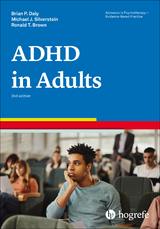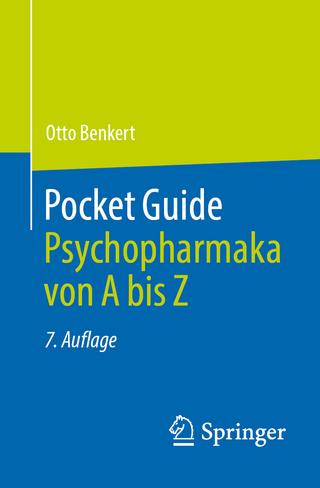Attention-Deficit/Hyperactivity Disorder in Adults
Hogrefe Publishing (Verlag)
978-0-88937-599-4 (ISBN)
New updated edition
Provides guidance on multimodal care and diversity issues
Includes downloadable handouts
The new edition of this popular text incorporates the latest research on assessment and treatment practices for adults with attentiondeficit/hyperactivity disorder (ADHD). The presentation of symptoms may differ considerably in adulthood and without appropriate symptom management, ADHD can significantly interfere in many aspects of life. When properly identified and diagnosed, however, outcomes in adults with ADHD who receive appropriate treatment are encouraging.
This volume is both a compact "how to" reference for use by professionals in their daily work and an ideal educational reference for students, informing the reader of all aspects involved in the assessment and management of ADHD in adults. This edition also explores how psychosocial adversity factors impact the development and functional impairments associated with ADHD and highlights strategies used in the multimodal treatment of ADHD in adults. Best practice approaches are offered for common problems encountered when carrying out treatments
A companion volume ADHD in Children and Adolescents is also available.
Brian P. Daly, PhD, is associate professor and department head of psychological and brain sciences at Drexel University. Dr. Daly is past president of the Philadelphia Behavior Therapy Association and recipient of grant funding from the Pew Charitable Trusts, W. K. Kellogg Foundation, Sixers Youth Foundation, Shire Pharmaceuticals, and Justice Resource Institute. He currently serves on the editorial board of Professional Psychology: Research and Practice, as well as on the advisory committees for several nonprofit organizations. Michael J. Silverstein, MS, is a postdoctoral fellow at the Center for Cognitive Behavioral Therapy in Media, PA. His research interests include etiology of trauma symptoms after exposure to acute, chronic, and systemic stressors and the relationship between attention-deficit/hyperactivity disorder and posttraumatic stress disorder in youth. Clinically, Mr. Silverstein is interested in providing empirically based interventions to toddlers, children, adolescents, and their families. Ronald T. Brown, PhD, ABPP, is the Dean of the School of Integrated Health Sciences at the University of Nevada, Las Vegas. Dr. Brown has been the past president of the University of North Texas at Dallas and also is the past president of the Association of Psychologists in Academic Health Centers and the Society of Pediatric Psychology of the American Psychological Association. Dr. Bown has published over 300 ar ticles and chapters as well as 12 books related to childhood psychopathology and pediatric psychology.
1 Description
1.1 Terminology
1.2 Definition
1.2.1 Diagnostic Criteria
1.2.2 Applicability of Criteria for Adults
1.3 Epidemiology
1.3.1 Prevalence and Incidence
1.3.2 Sex
1.3.3 Age
1.3.4 Ethnicity
1.4 Course and Prognosis
1.5 Differential Diagnosis
1.5.1 Disruptive, Impulse-Control, and
Conduct Disorders
1.5.2 Depressive Disorders
1.5.3 Anxiety Disorders
1.5.4 Trauma- and Stress-Related
Disorders
1.5.5 Bipolar and Related Disorders
1.5.6 Personality Disorders
1.5.7 Substance-Related and Addictive
Disorders
1.5.8 Neurodevelopmental, Physical, and
Medical Conditions
1.5.9 Environmental and Psychosocial
Factors
1.6 Comorbidity
1.6.1 Oppositional Defiant and Conduct
Disorders
1.6.2 Depressive Disorders
1.6.3 Anxiety Disorders
1.6.4 Learning Disabilities
1.6.5 Bipolar and Related Disorders
1.6.6 Substance-Related and Addictive
Disorders
1.6.7 Personality Disorders
1.6.8 Sleep-Wake Disorders
1.7 Diagnostic Procedures and
Documentation
1.7.1 Diagnostic Interviews
1.7.2 Rating Scales
1.7.3 Psychoeducational Testing
1.7.4 Neuropsychological Testing
1.7.5 Laboratory Testing
2 Theories and Models of ADHD in Adults
2.1 Neurobiological Factors in ADHD
2.1.1 Genetic Contributions
2.1.2 Neurological Factors
2.1.3 Cognitive Determinants
2.2 Environmental Risk Factors
2.2.1 Biological Adversity Factors
2.2.2 Environmental Toxins
2.2.3 Food Additives/Dietary Factors
2.3 Psychosocial Adversity Factors
2.4 Interactions Between Neurobiological,
Environmental, and Psychosocial Adversity
Factors
3 Diagnosis and Treatment Indications
3.1 Assessment Procedures
3.1.1 General Considerations
3.1.2 Developmental History
3.1.3 Clinical Interview
3.1.4 Behavioral Rating Scales
3.1.5 Differential Diagnosis/Comorbidities
3.1.6 Testing
3.2 The Decision-Making Process
3.3 Treatment Considerations
4 Treatment
4.1 Methods of Treatment
4.1.1 Psychopharmacology
4.1.2 Stimulant Medications
4.1.3 Nonstimulant Medications
4.1.4 Psychosocial and Psychological
Therapies
4.1.5 Coaching and CBT
4.1.6 Metacognitive Therapy: Time-
Management and Organizational-
Skills Training
4.1.7 Supportive and Family Therapies
4.1.8 Neurofeedback and Cognitive-
Enhancement Training
4.1.9 Psychoeducation
4.2 Mechanisms of Action
4.3 Efficacy and Prognosis
4.4 Variations and Combinations of Methods
4.5 Problems in Carrying Out the Treatments
4.6 Multicultural Issues
5 Case Vignettes
6 Further Reading
7 References
8 Appendix: Tools and Resources
| Erscheinungsdatum | 23.02.2024 |
|---|---|
| Reihe/Serie | Advances in Psychotherapy - Evidence-Based Practice ; vol. 35 |
| Verlagsort | Toronto |
| Sprache | englisch |
| Maße | 177 x 254 mm |
| Themenwelt | Geisteswissenschaften ► Psychologie ► Klinische Psychologie |
| Medizin / Pharmazie ► Medizinische Fachgebiete ► Psychiatrie / Psychotherapie | |
| Schlagworte | ADHD • Attention-deficit/hyperactivity disorder • neurodevelopmental disorder |
| ISBN-10 | 0-88937-599-2 / 0889375992 |
| ISBN-13 | 978-0-88937-599-4 / 9780889375994 |
| Zustand | Neuware |
| Informationen gemäß Produktsicherheitsverordnung (GPSR) | |
| Haben Sie eine Frage zum Produkt? |
aus dem Bereich




